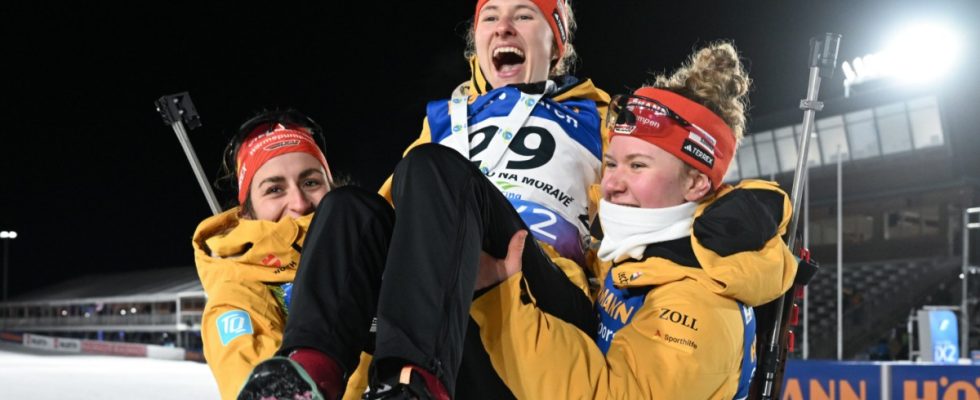The Italian Lisa Vitozzi has often stood and sat on winners’ stages, often enough to know that a speaking microphone should be switched on before speaking. This is worth mentioning because there was someone sitting next to Vitozzi on Tuesday evening who had never turned a microphone on or off at a press conference for the top three: a woman named Janina Hettich-Walz, a Baden-Württemberg native and professional biathlete, just inexperienced on the podium. Second place, silver, and then also at the World Cup: she was asked how she felt about it. Hettich-Walz soon spoke into the microphone, but nothing could be heard in the hall before her neighbor Vitozzi leaned over to her with a smile – and flipped the switch.
Speaking of which: “I have no idea how I managed to flip the switch,” said Hettich-Walz after her silver run at the Biathlon World Championships in Nove Mesto. And she didn’t mean the power button on the microphone. “I still can’t really believe it,” she continued, saying that in this individual competition over 15 kilometers of cross-country ski trails she remained clear for the first time ever in a race against the world’s best. When she arrived at the finish, the “2” lit up; she had crossed the finish line ahead of the Frenchwoman Julia Simon, who had won every women’s race in Nove Mesto to date. Behind the finish line, Hettich-Walz covered his face with his hands, almost in disbelief.
Tuesday’s silver medal is by far the greatest success of her individual career – and more than that: for the team of the German Ski Association (DSV), the medal represents a first countable mark that the men and women in the yellow ski jackets of many observers After the performances in the first five World Championship races, I hardly expected anything more. Occasionally there have been cynical whispers about the potentially historically weak record of the German ski hunters. These whispers should now fall silent, at least for the time being. And that wasn’t just due to Janina Hettich-Walz.
“This is a crazy day for the Germans,” says Selina Grotian
Just as amazed as the 27-year-old silver winner, the youngest World Cup starter in the DSV team stood behind the finish line shortly afterwards: 19-year-old Selina Grotian from Mittenwald had just run in a World Cup race for the first time in her life – and immediately Finished fourth. Grotian also hit all the targets and she even managed to just beat the time of her teammate Vanessa Voigt, who had previously also missed 20 of 20 shots and came fifth of the day. “This is a crazy day for the Germans,” said Grotian amid the noise of the almost 20,000 people in the Vysocina Arena, her quiet voice was barely audible. That half a minute was missing from bronze? Gifted. “For me it was like a movie. I can’t even understand it.”
From a German perspective, little in the first half of this World Cup went as many had imagined. Quite a few of the men’s and women’s teams struggled with their skis. Compared to the Norwegian or French material, the DSV slats sometimes seemed as if the toppings had been rubbed with the sticky fruit compote of the Czech kolache muffins. After the even deeper low in the men’s pursuit on Sunday, DSV biathlon sports director Felix Bitterling announced extra shifts in the German service truck. And the DSV ski technicians actually seem to have achieved a small miracle in a short space of time.
In temperatures four degrees cooler than recently, Vanessa Voigt’s skis glided through the newly renovated trail as smoothly as at the beginning of the season in Östersund. “Kudos to the technicians,” said Voigt, who had been crying out of sheer disappointment on Sunday after the chase and now had a tear of joy in her eye. “The material was so much better,” said sports soldier Hettich-Walz, which also made her feel “so powerful.” Only the best in the German team to date had the Czech fruit compote somehow still stuck under their skis. And there was obviously a reason for that.
Preuss’ skis on Tuesday had a different finish than the successful German trio – and appeared noticeably slower
Franziska Preuß was happy with her teammates; she too was relieved to win the German medal. “That’s super cool for Janina, I’m really happy about it. There’s nothing nicer, you can only take your hat off,” she said, who herself had traveled to the season’s highlight as the most promising German medal contender. The fact that the 29-year-old was 3.08 minutes behind in the end was partly due to her two missed shots, but not only. “I noticed on the track that I was losing an awful lot of time, even though I didn’t feel that bad,” said Preuß. “I don’t know” whether it was the skis; she was now tired of the topic.
What Preuß didn’t say, but was learned from a reliable source later on Tuesday evening: Her skis had received a different polish than the skis of Grotian, Voigt and Hettich-Walz. Clearly, the trio’s polish was the better choice for the “flip the switch” company.

